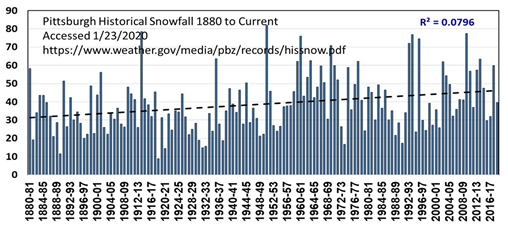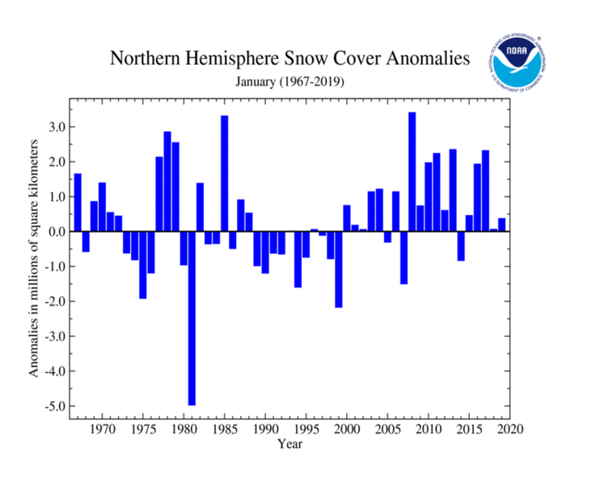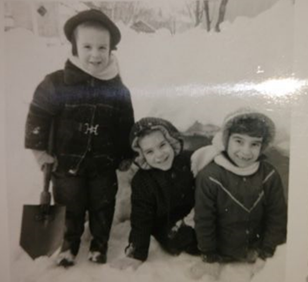Warming and the Snows of Yesteryear
I was recently reminded of one of the most common misconceptions about our changing climate that is often accepted as fact by climate skeptics and true believers alike. Last week a commentary written by a fellow geologist and colleague lamented the less snow and cold in recent winters compared to the winters of his youth in Kentucky in the 1950s and 60s. He also related a talk he had with an octogenarian in Europe over the holidays who told him that he also recalled common snow during Christmas in Germany but alas, no longer.
This nearly universally held belief that even the most skeptical of us tend to believe is “warming by recollection.” Virtually every person from snowy climes claims that winters today are nothing like they were when they were a child. This recollection reinforces the thought that we are experiencing global warming within our own lifetime. Never mind that the slight warming of ~0.6 oF (0.3 oC) that a typical 45-year-old may have experienced since that big snowfall when he was five years old is much too slight to be recognizable by anyone.
Before I looked at the actual data on the subject, I also believed that the snow of my youth in Pennsylvania exceeded any of recent decades. My research into snowfall records for my hometown of Pittsburgh, Pennsylvania, showed that my memory of snowfalls past was quite flawed. Snowfall here had been on the rise, rather than in decline.

Further examination from around the country revealed that this was not the exception, but the rule, as snow has generally been on the increase dating back many decades. My colleague’s recollection was equally flawed and records indicate that five of the top ten snowiest Februarys in his hometown of Lexington, Kentucky, had occurred since 1975!
This notion is not a new one. In 1801, Thomas Jefferson expressed similar opinions about the moderating temperature and lack of snowfall.
Both heats and cold are becoming much more moderate within the memory even of the middle-aged. Snows are less frequent and less deep…. The rivers which then seldom failed to freeze over in the course of the winter, scearcely (sic) ever do now.
-- Thomas Jefferson 1801
Just like Thomas Jefferson in 1801, we remember those times that are remarkable, while forgetting the unremarkable. Our memories are filled with the times of extreme weather conditions as opposed to the moderate.
Big snowfalls periodically happen. Just like the picture below of me and my siblings in the snow in 1961, a six or eight-inch snowfall may come well past your knees when you are only five years old and three feet tall. It is a memory indelibly etched in your brain because it was so awesomely fun. (The odd-looking fellow in the bowler hat is my younger brother).
Increasing snow is not isolated to random sites in the United States but confirmed using data from the Rutgers Global Snow Lab (GSL) that reveal snow cover both in North America and across the northern hemisphere have been increasing.

The mistaken notion of decreasing snowfall in our lifetimes reinforces the idea that many people have that supposed man-made warming is more significant and impactful than it really is. Despite the evidence to the contrary we are warned regularly of the “end of snow” from warming driven by our use of fossil fuels. The Intergovernmental Panel on Climate Change warned us in 2001 that “milder winter temperatures will decrease heavy snowstorms.”
Dr. Kathryn Hayhoe, no stranger to failed alarmist predictions, stated in 2008 that the California region would experience 70% to 90% reduction in snowfall due to warming. This was just three years before California’s snowiest winter on record of 2010/2011.
As with so many other climate fantasies the “end of snow” prediction doesn’t stand up to review of the actual data. Go ahead and buy those skis, you will be using them often in the decades to come.
Gregory Wrightstone is a geologist and author of the bestselling book, Inconvenient Facts: The science that Al Gore doesn't want you to know.

FOLLOW US ON
Recent Articles
- Deep Dive: The Signal Chat Leak
- Mark Steyn’s Reversal of Fortune
- Where We Need Musk’s Chainsaw the Most
- Trump Is Not Destroying the Constitution, but Restoring It
- The Midwest Twilight Zone and the Death of Common Sense
- Hijacked Jurisdiction: How District Courts Are Blocking Immigration Enforcement
- Transgender Armageddon: The Zizian Murder Spree
- Jasmine Crockett, Queen of Ghettospeak
- The Racial Content of Advertising
- Why Liberal Judges Have a Lot to Answer For
Blog Posts
- Amid disaster, watch Bangkok clean up and rebuild
- Katherine Maher shoots herself, and NPR, in the foot
- A visit to DOGE
- You just might be a Democrat if ...
- Yahoo Finance writer says Trump’s tariffs will see America driving Cuban-style antique cars
- Kristi Noem and the prison cell
- Dividing the Democrats
- April 2nd: Liberation Day and Reconciliation Day don’t mix
- Red crayons and hospital gowns
- The Paris Climate Agreement was doomed from the start
- Well excuse me, I don't remember
- Bill Maher goes civil
- Mass shootings: we're all survivors!
- Tesla and a second
- Snow White: a bomb for the ages






